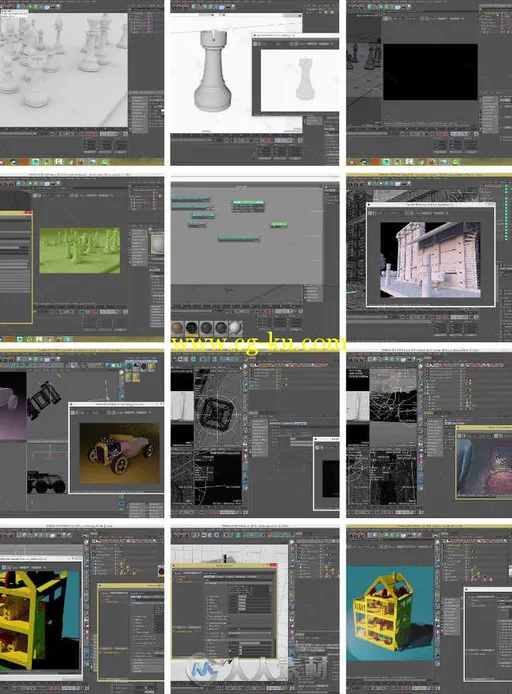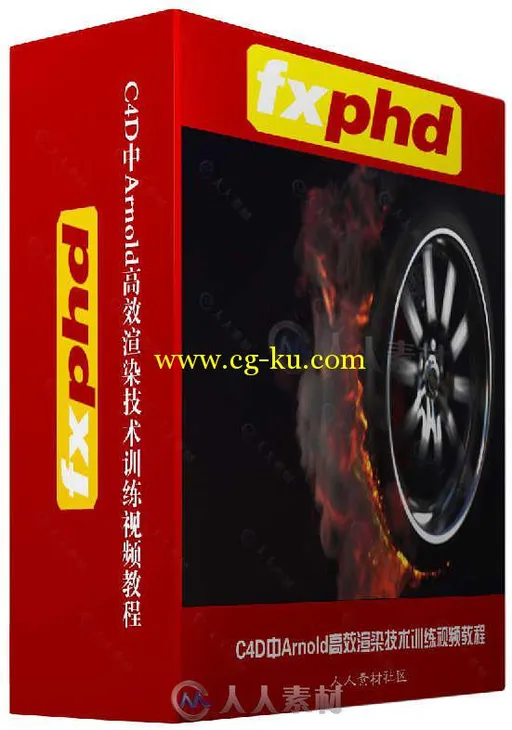本视频教程是由FXPHD机构出品的C4D中Arnold高效渲染技术训练视频教程,时长:10小时,大小:3.6 GB,MP4高清视频格式,附工程源文件,教程使用软件:Arnold,Cinema 4D,共10个章节,语言:英语。
本教程由Da Costa讲授。Da Costa是Lukkien公司(荷兰的一家多媒体公司,在职员工200多名)计算机合成图像领域的技术领导。Da Costa除了制作计算机合成图像,还致力于计算机合成图像的研发,曾为很多国家和国际活动工作,与Philips, Pioneer, MTV, Eneco, Schiphol Airport, Samsung 和Toyota等品牌均有过合作关系。
Da Costa在程序设计领域也有涉足,为不同的3D和2D应用软件公司建立了许多专有插件和管道工具。近年来,Da Costa为像Maxon和Solidangle的一类公司做测试员。
Cinema 4D是一套由德国公司Maxon Computer开发的3D绘图软件,以及高的运算速度和强大的渲染插件著称。Cinema 4D 应用广泛,在广告、电影、工业设计、等方面都有出色的表现,例如影片《阿凡达》有花鸦三维影动研究室中国工作人员使用Cinema 4D制作了部分场景,在这样的大片中看到C4D的表现是很优秀的。在其他动画电影中也****网使用到C4D的有很多如《毁灭战士》(Doom)、《范海辛》〈Van Helsing〉、《蜘蛛侠》、以及动画片《极地特快》、《丛林总动员》(Open Season)等等。它正成为许多一流艺术家和电影公司的首选,Cinema 4D已经走向成熟,很多模块的功能在同类软件中是代表科技进步的成果。
Arnold渲染器是一款高级的、跨平台的渲染 API。是基于物理算法的电影级别渲染引擎,目前由Solid Angle SL 开发。正在被越来越多的好莱坞电影公司以及工作室作为首席渲染器使用。
Arnold渲染器是基于物理算法的电影级别渲染引擎,由Solid Angle SL 开发。正在被越来越多的好莱坞电影公司以及工作室作为首席渲染器使用。
与传统用于 CG 动画的 scanline(扫描线)渲染器(Renderman)不同,Arnold 是照片真实、基于物理的光线追踪渲染器。Arnold 使用前沿的算法,充分利用包括内存、磁盘空间、多核心、多线程、SSE 等在内的硬件资源。
Arnold 的设计构架能很容易地融入现有的制作流程。它建立在可插接的节点系统之上,用户可以通过编写新的 shader、摄像机、滤镜、输出节点、程序化模型、光线类型以及用户定义的的几何数据来扩展和定制系统。Arnold 构架的目标就是为动画及 VFX 渲染提供完整的解决方案。
FXPHD机构是老牌在线教学网站,网站的创建者就是Fxguide的团队,FXPHD制作了大量视觉特效、后期制作、摄影摄像的精品教程。每年支付4000元左右,就可以享受其中5门课程的教学,还可以提供VPN链接内网,每套课程都是10周左右的时间,每节课30分钟左右,包含训练文件和素材。FXPHD主打专业教学,所有的教程作者都是该领域的权威,必须拥有大量的项目经验。
FXPHD CD4221 Using Arnold in Cinema 4D
Da Costa will get you up and running with Arnold for Cinema 4D. This course will demonstrate all the fundamentals about working with the Arnold Render Engine inside C4D. We will look at several technical and creative aspects of shading, lighting and rendering with Arnold. We will discuss ways in which we can reduce rendertimes and how to adopt an efficient workflow with Arnold. We will also shortly discuss some compositing aspects of C4DtoA. And at the end of this course you should feel comfortable taking on any project with Cinema 4D and the Arnold render engine.
The course is taught by R.P. (Netinho) da Costa. Da Costa is currently working as a CGI artist and TD at Lukkien. Lukkien is a multimedia company with a little over 200 employees. It is located in the Netherlands. Besides doing CGI, Da Costa is also responsible for CGI related R&D. He has worked on many national and international campaigns. For brands like Philips, Pioneer, MTV, Eneco, Schiphol Airport, Samsung and Toyota.
Next to CGI his background involved several years of programming. He has built dozens of proprietary plugins and pipeline tools for different Companies for both 3D and 2D applications. In recent years he has been an active beta tester for companies like Maxon and Solidangle.
course syllabus
Class 1: We introduce you to the Arnold Render Engine inside Cinema 4D. We discuss some important aspects to understand about Arnold. After that we quickly get you comfortable using Arnold by completing a short and simple chess scene project from beginning to end.
Class 2: We look at everything related to lighting inside Arnold. We take a look at all of the different light types that comes shipped with Arnold for Cinema 4D.
Class 3: We discuss all the important aspects of the render settings in C4DtoA. We look at the art of sampling and how to make decisions about overrides, ray depth, diagnostics and other important render settings.
Class 4: We explore the important arnold standard shader. To do this we complete shading of an entire lego technics airplane scene. We also take a look at some other shaders that comes shipped with arnold.
Class 5: We step it up a notch and take a look at shader layering with the unique C4DtoA shader Network. We explore creative and advanced ways to generate layer masks by using several nodes such as ao, shading state nodes and normal information.
Class 6: We focus on compositing options and multipass workflows within Arnold and Cinema 4D. We explore how to create shadow mattes inside Arnold, how to create and export object buffers and we discuss output variables (AOV’s) in more depth. We also dive inside a compositing application to see how to recreate a beauty pass based on our rendered AOV’s. In compositing, Da Costa will show some common problems and how to solve them.
Class 7: We take a look at the different ways in which arnold and cinema 4D are integrated. We look at the integration between popular cinema 4D aspects such as splines, particles and the mograph module.
Class 8: We demonstrate ways to further optimize render speed and we look at efficient workflows and habits. We take a look at optimizing materials and textures by using the TX format. We discuss ways in with the already memory efficient Arnold Engine can me made even faster. Furthermore we discuss some additional solutions for reducing noise and other problems that may occur during rendering.
Class 9: We shade, light and render an interior scene from beginning to end.
Class 10: Missing


发布日期: 2016-4-2